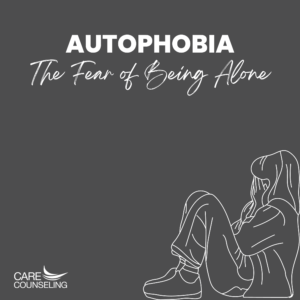 Autophobia = fear of being alone. Autophobia is not recognized as an official diagnosis but falls within the category of a situational phobia, triggered by the fear of being alone or being lonely.
Autophobia = fear of being alone. Autophobia is not recognized as an official diagnosis but falls within the category of a situational phobia, triggered by the fear of being alone or being lonely.
Those who experience autophobia feel that they need to be around others to feel safe. There is excessive worry about being alone which impacts daily functioning. Being alone, even in familiar spaces can create heightened anxiety with fears of all the “what-ifs’ that could happen while being alone.
The physiological response can be symptoms associated with panic attacks, feeling overwhelmed with fear, and detachment from one’s body (depersonalization).
While individuals can develop phobias for a variety of reasons, biopsychosocial factors contribute to anxiety and panic. This includes your brain chemistry, genetic predisposition, learned responses to fear, and environmental factors.
Here are several additional factors that can contribute to fears of being alone.
Feeling Abandoned Within Interpersonal Relationships.
Children with ruptures in their attachment to a parent or primary caretaker experience emotional (and often physical) separation, losing the ability to access this person as a safe and secure base for comfort. The child may struggle with regulation and self-soothing which may persist into adulthood. There are many different types of events that contribute to attachment trauma. Some factors are directly related to the caregiver’s health as coping with a life-threatening illness, experiencing mental health issues such as postpartum depression, or struggling with substance use can directly impact the parent-child relationship. Death, loss, and separations that impact the child are additional factors as well as abuse and neglect. Subtle forms of psychological control including the use of shame and not validating a child’s feelings are more covert events that can impact the quality of interpersonal relationships.
Exposure to multiple, repeated traumatic events within childhood (especially events that directly impact the interpersonal relationship and the ability to form a secure attachment) can result in complex trauma. Those who are seeking therapeutic support are often treated for trauma or a stressor-related disorder such as post-traumatic stress disorder and some people who struggle with chronic instability within interpersonal relationships may meet the criteria for borderline personality disorder.
Experience of Being (or Feeling) Alone During a Highly Stressful or Traumatic Event.
Being alone (or feeling alone) during scary events can feel overwhelming. It can happen to children and adults of all ages. Sometimes children have stepped into the roles of caretakers in situations such as responding to a drug overdose or life-threatening emergency. Being alone when one’s sense of safety is threatened or violated can also make it hard to be alone. Taking steps to plan for emergencies such as creating a safety plan and taking steps to help create a safe environment can help. Having access to crisis resources is also important. https://988lifeline.org/
In some situations, the most distressing response can be the feeling of being alone. If you have an automatic response of fear or panic such as when you are lost or are experiencing a stressful situation, it can be difficult to seek support and regulate the body’s response when in a state of panic. If situations such as living alone, being home alone, or going somewhere in public alone spikes a fear response, these can also be challenging when encountered.
The good news is that there are effective strategies to help manage fears. For situational phobias, techniques such as exposure therapy, cognitive behavioral techniques, and medication can be helpful. For relational trauma, a wide varieties of modalities can be effective such as using a person-centered approach integrating cognitive behavioral therapy (CBT) and dialectical behavior therapy (DBT). Prolonged exposure therapy (PE) and Eye Movement Desensitization and Reprocessing (EMDR) therapy are specialized approaches that can also help.
Written By: Charlotte Johnson, MA, LPCC
We’re Here to help
Our wellness experts will be happy to take care of you. You can CLICK HERE to schedule an appointment now or call (612)223-8898.
Meet Clinicians
We’re united by our commitment to providing effective, relevant, and innovative mental health support at all stages of your journey. Click Here to find a therapist or find out more about who we are, where we come from, and how we live out CARE’s mission every day.
The professionals at CARE are actively collecting and creating resources to help with what you need and address frequently asked questions. We’re Here for You.



